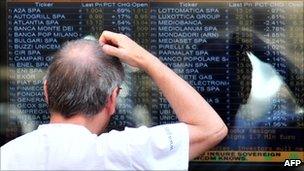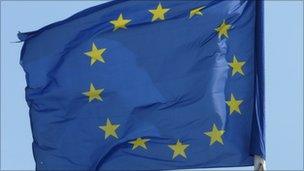Bond markets: Villains or saviours?
- Published
- comments

The bond markets have cast an unsentimental eye on the fundamentals in Europe
The summit in Brussels on Thursday is turning out to be a cliffhanger.
Chancellor Merkel is lowering expectations. The agenda has not yet been set. But the story of the past 18 months in Europe is that events have been driven not by politicians but markets. The markets drive and the politicians react.
When the 17 leaders of the countries that use the euro leave the Belgian capital they will all be watching and waiting for market reaction.
There is an oft-quoted story of a remark made by one of Bill Clinton's advisers, James Carville, also known as the Ragin' Cajun. He said that if there was reincarnation, he once "wanted to come back as the president or the Pope or a .400 baseball hitter. But now I want to come back as the bond market. You can intimidate everybody."
European leaders and officials often describe bond market moves as "attacks", or they rail against speculators. It raises the question as to whether the bond markets are malign actors or vigilantes - or can they be reformers, enforcers of long-overdue change?
Without doubt there has been some betting on failure but the bond markets have cast an unsentimental eye on the fundamentals in Europe and they have not liked what they have found. Way before governments and European officials they identified debt as the core of Europe's problem.
When, last year, Spain came under pressure in the markets, Prime Minister Zapatero came up with a raft of structural reforms to make hiring and firing easier. Now in a country with chronic youth unemployment it raises the question of why he had not stirred before?
Portugal is one of the least competitive and productive countries in Europe. But only under pressure from the markets did it discover structural reforms which finally were agreed as part of an EU/IMF bail-out.
Last week Italy found itself under pressure from the markets. Its borrowing costs edged above 6%. In panic it passed an austerity budget in just five days. Whilst I was in Rome I was told that Italy was now thinking of opening up some of its closed professions, making the labour market more flexible. There was fierce resistance, apparently, from lawyers. But here again was a country that for a decade has had anaemic growth and yet only now is considering reforms which many people would regard as obvious.
Productivity is a third less than Germany's, yet labour costs are a quarter higher. So it begs the question as to why this was not addressed earlier. As former EU Commissioner Mario Monti said, Italy had to raise "productivity, competitiveness and growth".
Running out of options
And then there are the perks and privileges of its lawmakers. In 2010, members of the Chamber of Deputies were earning an average gross salary of 140,000 euros (£123,000; $199,000). Italian MPs are the highest paid in Europe. And the salary does not include free accommodation and flights paid by the state. There are many former legislators drawing fabulous pensions of 15,000 euros and more a month. Even the parliamentary barber gets 133,000 euros a year.

European leaders insist the EU is still in good shape
But only now - with the markets at the gate - is this level of privilege being questioned as to whether it is sustainable.
In Greece, too, as the bond markets circled, a former anti-terrorist chief was appointed to deal with tax evasion. Paying taxes in Greece is often seen as a lifestyle choice rather than an obligation. But again the question occurs: Why did it take the markets to force tax evasion onto the Greek agenda?
Now to be fair to the Papandreou government, it has - albeit under pressure - forced through structural changes. The protests by taxi drivers this week were against opening up their profession to outsiders. Prime Minister George Papandreou says that "as a country we have made an unprecedented effort". The problem in Greece is that the proposed measures are not seen as paving the way for further growth but paying for the sins of the bankers. When he says "it is time for Europe to wake up", it is the cry of a politician running out of options at home.
For a long period European governments have been wedded to a social model that provided generous welfare. Europe was flattered by observers. Just 18 months ago a well-known American economist lauded Europe as a place where "social progress and justice go hand in hand." An American academic wrote a book describing Europe as "a beacon of humanity".
There may be some truth in these observations yet Europe's model was probably unsustainable in the real world of nimble, flexible, fast-changing economies. Some say that an over-regulated, over-harmonised, over-centralised Europe is ill-placed to provide the growth Europe so desperately needs.
The 10 fat years since the launch of the euro are now seen as, in part, a grand illusion. Sure there was growth but prosperity was built on low interest rates, easy money, capital inflows and debt. In some countries it fuelled unsustainable booms. Wages soared. What was neglected was productivity, innovation and competitiveness.
Some will argue that there is a case for reining in naked short-selling or the trading in credit default swaps, but the markets have challenged Europe's comfortable assumptions.
For as Chancellor Merkel et al gather tomorrow, Europe's crisis is not just Greece. It is debt, lack of growth and a banking system which despite all the stress tests remains fragile.